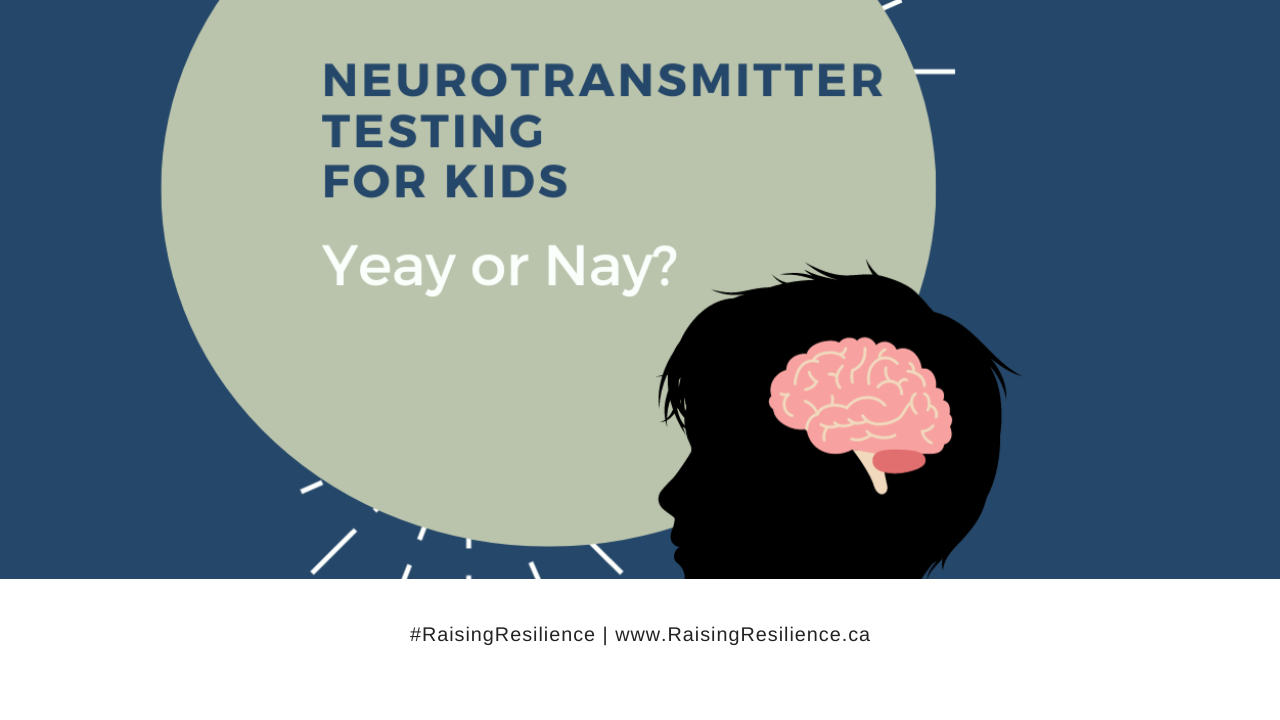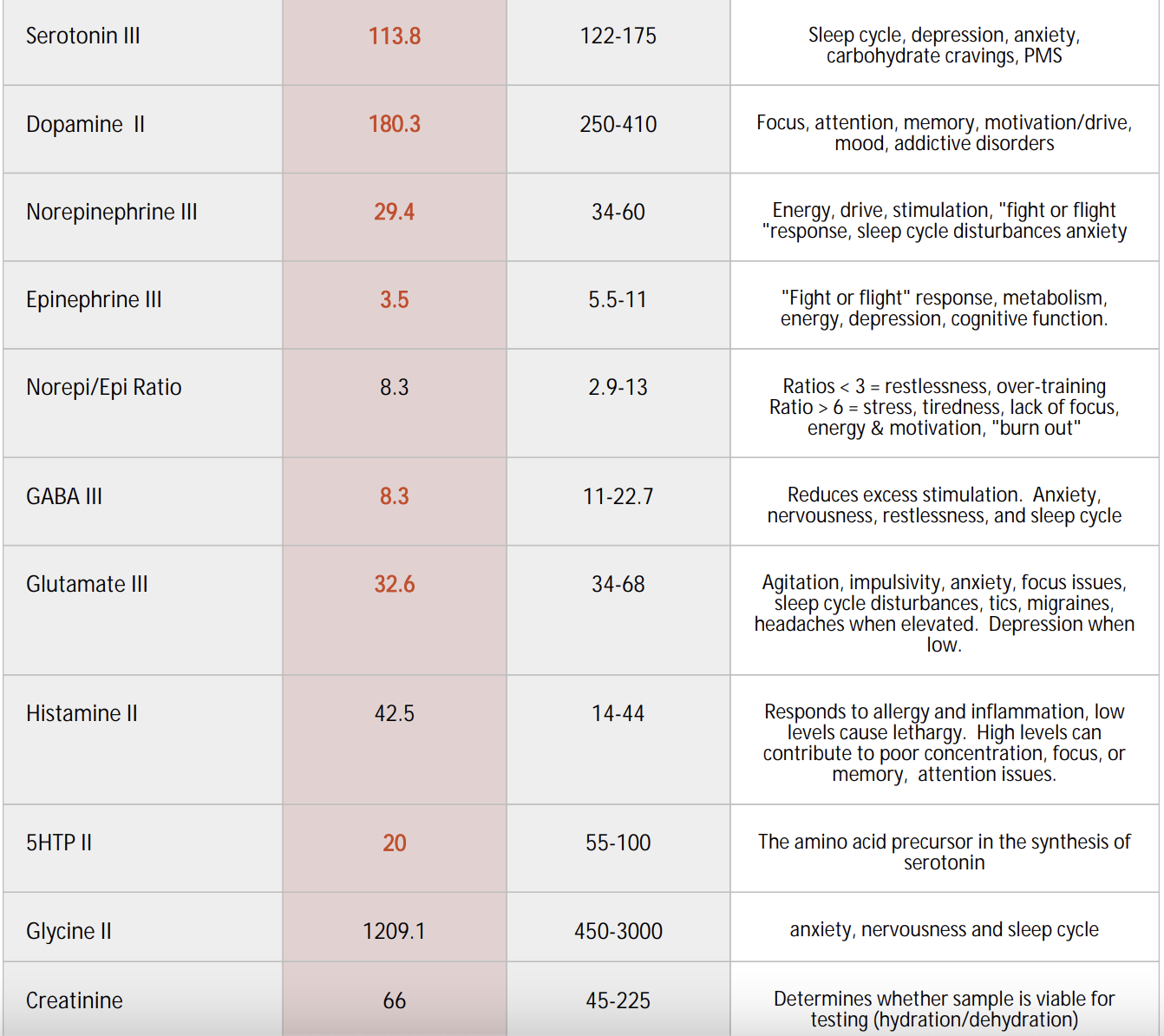Understanding Your Child's Mind: The Value of Urinary Neurotransmitter Testing

For years I harbored skepticism toward urinary neurotransmitter testing. My training taught me that urinary output doesn't mirror brain activity, so why bother with this one?
It is true that neurotransmitters in the urine don't reflect neurotransmitters in the brain, but my perspective has shifted and we now offer this test to our members.
Urinary neurotransmitter testing isn't about measuring brain chemistry. It gives us a window into how the body is managing stress. When we combine this insight along with other biomarkers we can quickly zoom in on our most important leverage points to help a child feel better faster.
The Power of Understanding A Child's Experience
Consider Tammy - a hypothetical teen girl, overwhelmed with feelings of darkness and gloom and anxiety who experiences periodic panic attacks.
A lot is going on inside and around Tammy! She's in what I call a "stress storm" - a time of particularly intense stress (aka puberty) that requires a more-than-average amount of nourishment to get through.
Trouble is, Tammy might be more interested in Pizza, Slurpees, and Monster Drinks than nourishing herself.
Sound familiar?
We find that functional tests in general are great tools to facilitate learning and change. I mean, most of us know that sleep is important, good food is important, we should eat less sugar, hydration is crucial... and on and on and on.
But kids often don't care.... until they see it on paper.
Once you see things on paper and start to put together the story of your body, you can make strategic choices about how to support it.
Kids (especially teens) often enjoy the power of that knowledge. It gives them the reigns. It allows them to drive their experience.
So let's see if we can give our hypothetical Tammy the reigns by showing her what's going on in her body.
Decoding Neurotransmitters

The urine test we use evaluates the balance between seven pivotal neurotransmitters.
Remember - urinary output does not equal brain levels. But that's ok - we're looking at something different. The lab we collaborate with has vast experience, having conducted over 50,000 urine tests, linking urinary neurotransmitter outputs with mood symptoms to establish weight and age-based reference ranges.
Put another way, their research shows us what kind of NT output a healthy, resilient person should be showing based on their weight and age. We have our clients fill out an extensive questionnaire and make sure they collect the urine at the right time of day and under the right circumstances so we can anticipate the impact of the environment, medication, food, and supplements on output, and we correlate with symptoms.
So back to Tammy...
If her serotonin output is lower than typical for her age and weight, this can help her understand that her nervous system might not have the resources it needs to feel optimistic and resilient even though everyone around her tells her she should be. It also tells us why melatonin is helping her sleep (since she needs serotonin to make melatonin) and helps her understand why Tryptophan may help her feel better.
With dopamine being lower than optimal she might feel lethargic and forgetful. She might struggle to retain what she reads. She might give up quickly.
If we see that her Norepi to Epi ratio is quite good then we know we're likely not dealing with a methylation issue since methylation is key for conversion (though we can cross-check that using a genetic, histamine, or Organic Acid test). We also can see that her adrenals are still managing the stress ok.
We might be dealing with simply a lack of raw materials. She needs more protein and now she knows why. And if she's chosen to be a vegan - as many teen girls do - we'll need to optimize her diet to make sure she's meeting her B vitamin and Zinc requirements so she can make those neurochemicals. She'll also need sufficient copper and vitamin C to make those catecholamines.
The Glutamate to GABA ratio tells her that she can effectively convert glutamate to GABA but again, if she gives her body more raw materials she'd likely feel less overwhelmed by life. A high-protein breakfast and a little supplemental GABA throughout the day may be incredibly helpful.
Not Diagnostic, But Still Helpful
Seeing these levels on paper is not diagnostic of anything. But it helps validate our hypothetical teen's experience and explain to her why the right food and vitamins will help her feel better.
She is more likely to comply with recommendations when she understands that her body is not falling apart and the world is not crashing around her and the despair she feels is completely valid despite how great people tell her her life is.
Her body is responding to stress in the way it was designed.... but it's running out of resources.
Adding The Insight Of Genetics
Genetics play a role in our behavior and stress responses too so I really like running a nutrigenomic (genetic) test alongside Neurotransmitter tests when we can.
When we look at genetics, we find some children are "wired" to perceive stress differently due to genetic factors. Even if diet is good, these kids are more likely to have higher outputs of neurotransmitters because they are not being bound or transported optimally.
However, the field of epigenetics has taught us that our genetic expression is profoundly influenced by our environment and lifestyle. This means that regardless of genetic predispositions, children can learn to cope better with stress if nurtured in the right environment.
When we run our Resilience Genetic panel we see tendencies around stress management. When we run a urinary Neurotransmitter test alongside, we can help parents and kids make strategic decisions around which nutrients, lifestyle factors, and environments are most likely to ensure optimal neurotransmission.
When Urine Neurotransmitter Output Can Be Insightful
As with any functional test, this one is reflective of a snapshot in time and it needs to be correlated with symptoms. Always.
This test helps us:
- Identify which amino acids and targetted nutrients can help bring balance most quickly
- Understand the impact of mood-altering medication (if it's in the picture)
- Understand how well the nervous system is managing stress
- Validate a family's experience and track changes
It's not diagnostic of pathology; it's reflective of how the body is functioning at this point in time. When we add the insight of genetics we further understand whether there is a vulnerability in how our body makes, uses, and processes neurotransmitters.
The Bottom Line
Neurotransmission is impacted by genetics, nutritional status, gut health, inflammation, stress load, and more. But no matter what's at play, what kids need to know is that these important messengers running through their bodies influence how they feel. From there they need to understand that the nutritional steps we are suggesting to help them feel better are aimed at optimizing neurotransmission.
We want to improve nutrient status... to optimize neurotransmission
We want to reduce inflammation... to optimize neurotransmission
We want to detoxify... to optimize neurotransmission
We want to improve gut health... to optimize neurotransmission
What we want for a child is for messages of calm and safety to dominate over messages of fear, worry, and threat. When we look at the balance between inhibitory and excitatory neurotransmitters in the urine, combined with symptom tracking and other biomarkers, we can get a sense of this.
This not only helps parents provide tailored nutritional, educational, and parental guidance but it also empowers children with self-awareness and validates their experience.
I am finding that urinary Neurotransmitter tests are particularly helpful alongside our Resilience DNA Panel. That panel tells us about tendencies related to the transport of neurotransmitters and nutrients that are essential to nervous system regulation. When looked at together, these two tests give us a great starting point and help kids understand themselves better.
Related Posts:
More on Neurotransmitters: https://www.jesssherman.com/blog/nourishing-happy-minds-the-impact-of-neurotransmitters
More on genetics: https://www.jesssherman.com/blog/is-your-child-wired-for-anxiety-inattention-irritability
Decoding Teen Mood Swings: https://www.jesssherman.com/blog/decoding-teen-mood-swings-the-role-of-the-comt-enzyme
Can GABA help with separation anxiety? https://www.jesssherman.com/blog/can-gaba-help-kids-with-separation-anxiety






